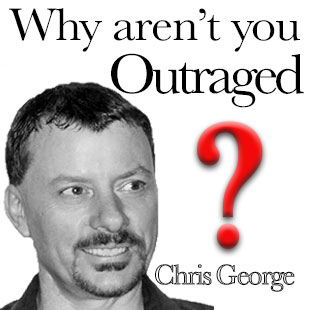
(CHRIS GEORGE / iNFOnews.ca)
October 17, 2017 - 12:37 PM
OPINION
The human world is a very unintuitive place.
The natural world, as we have come to know it, is predictable in that it follows the rules of physics and chemistry. We can examine an object or a system and make some pretty good guesses about the likely consequences of actions and activities.
Not so with politics, the economy, or many of the systems they support, including how our society meshes with the natural world. The forces at play are human, unpredictable, and often not rational. Counting on both predictability and rationality in our affairs can lead to costly unintended consequences.
Our current difficulties with CO2 pollution provide a great example. At its core, the issue is one of energy and how it relates to our political economy. There is an old saw that states that "money makes the world go around". As far as money is a proxy for energy, there is some truth to it. Our economy runs on energy. The great strides in living standards we have generated over the past three centuries has flowed from our ability to turn our collective inheritance of fossil energy into wealth.
We are now in a predicament. That inheritance, or at least the cheap and easily extracted portions of it, has been spent. CO2 pollution is causing consequences that will prove to be more costly to deal with than prudent mitigation would have been. And there has been an enormous push from government and industry to push the responsibility for this pollution onto individuals. This typically takes the form of promoting "smart" choices in the marketplace. L.E.D. bulbs, electric vehicles, cloth shopping bags; the list of low carbon choices on offer grows daily.
There are things to consider as an individual when faced with making more sustainable choices in how we spend our money. Electric vehicles are a popular choice these days for those who see technology as a way out of our predicament. Selling a gas guzzler and buying an EV has a couple of impacts that people do not think about. The impacts are small, but given the number of people likely to jump on board over the next decade, they will add up.
Jevon's Paradox is a principle of resource economics. It states that when we take steps to decrease our use of an energy source that we encourage others, via the impact that lower demand has on price, to come up with new ways of using that resource. Simply put, we make it cheaper and thus more people are able to utilize the energy.
The idea has applications beyond energy, of course. Putting the 3/4 ton pick-up up for sale lowers the price of all used 3/4 ton pick-ups currently on the market. Supply and demand at work. It also lowers demand for fuel, lowering the price and making it easier and cheaper for others to purchase.
It also frees up resources for the person making the switch. Electric vehicles are cheaper to fuel and cheaper to maintain than internal combustion vehicles. As the purchase price drops, this promises to allow us to keep more cash in our pockets, cash that we will use to make other energy intensive purchases, like vacations, new furniture, and even new homes. Investing our new found wealth in stocks or bonds ultimately supports new uses of energy as companies take the new capital to build out the scale and scope of their activities. So unless we are willing to take a pay cut commensurate with our newfound savings, well, there is no point in even considering that, is there?
The former B.C. Liberal government and their predecessor, the Social Credit Party, built political empires laying pavement and building bridges in this province. It is hard to go wrong when you come into a community and promise millions of dollars of spending to alleviate traffic congestion and improve safety. Improving safety is absolutely a valid use of taxpayer dollars, but due in part to Jevon's Paradox, improving capacity with an eye to removing congestion is a fools errand.
Look at the recent story of the Port Mann Bridge as a powerful example of this principle at work. Since the toll was removed, individual trips over the bridge have increased by over 30,000 per day. Building new capacity has the same impact on people's choices as removing the tolls. It makes trips cheaper and more convenient. It actually increases traffic."
The way out for transportation isn't tolls or road pricing. The way out is to eliminate taxpayer funding for building more capacity into our road network. Couple that with increasing the funding for fast, efficient, and effective rapid transit and the stated goal of lowering traffic congestion may actually be met. We would also free up public resources for further safety improvements and proper ongoing maintenance of existing infrastructure.
If individual car trips become more expensive in time, hassle, and money, they will fall by the wayside in favour of transit. They will also discourage further sprawl in how we house ourselves, a move that will have significant impacts on our aggregate energy use over the next couple of decades. Fifty-six per cent of British Columbians live in the Greater Vancouver Regional District. This is where taking these issues into account will show the greatest return on pollution and energy use.
The idea behind Jevon's Paradox leads to unintuitive outcomes that we need to be aware of in our public planning. "Common sense", in this case, doesn't work.
— Chris George believes one measure of a just society is found in how well it balances fiscally conservative economics with social responsibility and environmental soundness in all of its living arrangements.
News from © iNFOnews, 2017